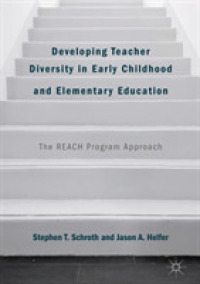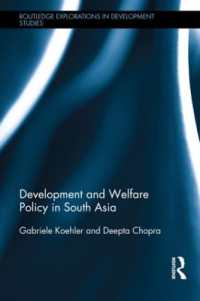- ホーム
- > 洋書
- > 英文書
- > Science / Mathematics
Full Description
This book builds upon the range of Indigenous theory and research found in Volume I and applies these learnings to interventions in schools, communities, teacher education and professional development. It is part of a two-volume set addresses a growing recognition that interdisciplinary, cross-cultural and cross-hybrid learning is needed to foster scientific and cultural understandings and move STEM learning toward more just and sustainable futures for all learners.
Authors working in Eurocentric settings of schools and colleges—whether in the continental or island United States, Canada, Thailand, Taiwan or Chuuk—utilize storytelling, place, language and experiential learning to engage students in meaningful, highly contextualized study that honors ancestral knowledge and practices. They recognize that their disciplines have been structured and colonized by Eurocentric/American frameworks that lack storied, ethical contexts developed through living sustainablyin particular places. Recognizing that students seeking to enter STEM majors and careers now must be knowledgeable in multiple ways, authors describe innovative ways to immerse precollege learners as well as developing and practicing teachers in settings that intersect culture, place, heritage language, and praxis that enable Indigenous and local knowledge to become central to learning. Twenty-first century technologies of distance learning, digital story-telling, and mapping technologies now enable formerly marginalized, minoritized groups to share their worldviews and systems of knowledge.
Contents
PART I: INDIGENOUS INNOVATIONS AND INTERVENTIONS IN SCHOOLS AND COMMUNITIES.- Chapter 1. Utilizing Indigenous knowledge systems and Western science in science education (DANIEL LIPE).- Chapter 2. Mathematics education on a worldwide voyage: Engaging values and place-based curriculum to support college, career, and community readiness (LINDA H. L. FURUTO).- Chapter 3. Kokākoukula, kokākou home pāhanainoa hale kula: Our school, our home; A place-based curriculum project on school building names (SHAWN MAPUANA KOBASHIGAWA).- Chapter 4. Changes in students' science concepts and discourse: A case study of place-based education in rural Thailand (NANTANA TAPTAMAT).- Chapter 5. Way Finding: TúúttúnnapenChuuk. Indigenizing Chuukese Education (MARGARITA B. CHOLYMAY, L.J. RAYPHAND AND JAMES SKOUGE).- PART II: PROGRESS TOWARDS INDIGENIZING TEACHER EDUCATION AND PROFESSIONAL LEARNING.- Chapter 6. The will of the ancestors—a collaborative elementary science curriculum design initiative (APALAH- JAMES AYULUK, NAQUCIN-FLORA AYULUK, AND CIKIGAQ-IRASEMA ORTEGA).- Chapter 7. Science and Story (DAVID B. ZANDVLIET, BARBARA J. WILSON (KII'ILJUUS), CARLOS G.A. ORMOND, JASON ALSOP (GAAGWIIS)).- Chapter 8. Forum Place-based curriculum in Indigenous settings: Stories behind two signature projects (IRASEMA ORTEGA AND DAVID ZANDVLIET).- Chapter 9. Learning from our place, learning from each other (CORRIN BARROS, EMERSON LOPEZ ODANGO, JUANITA S. R. LAWRENCE AND JOYMINDA GEORGE).- Chapter 10. A'o Hawai'i: The role of culture and place in empowering teacher leaders as STEMS2 educators (TARA O'NEILL, ANNA AH SAM, SHARI JUMALON, KIMBERLEE STUART, AND MARY ANNA ENRIQUEZ).- Chapter 11. The effects of place-based ecological modules on Indigenous Taiwanese students' science learning (TSUNG-WEI YAO, HSUAN-FANG HUNG, CHIA-LING CHIANG, SU-FEN LIN, AND CHIUNG-FEN YEN).- Chapter 12. Final Thoughts (PAULINE W. U. CHINN AND SHARON NELSON BARBER).






